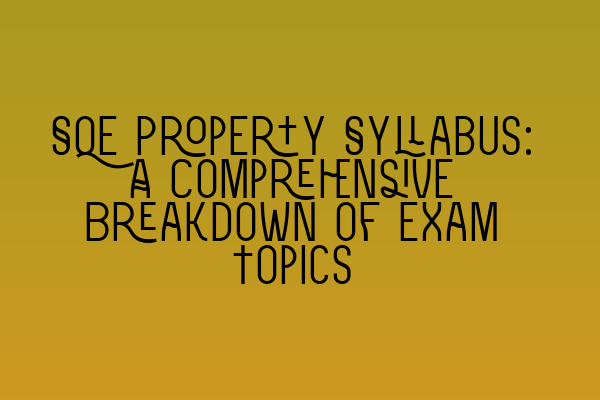SQE Property Syllabus: A Comprehensive Breakdown of Exam Topics
Preparing for the Solicitors Qualifying Examination (SQE) is a significant milestone in your journey to becoming a qualified property lawyer. To ensure success, it is crucial to have a thorough understanding of the exam syllabus and the key topics that will be assessed. In this article, we will provide you with a comprehensive breakdown of the SQE Property syllabus, highlighting the key exam topics you need to focus on.
1. Land Law and Practice
Land Law and Practice is a fundamental component of the SQE Property syllabus. It covers a wide range of topics, including:
- Freehold and leasehold estates
- Conveyancing principles and procedures
- Registration of title
- Co-ownership
- Leases and tenancies
- Landlord and tenant law
It is crucial to have a solid understanding of these topics, as they form the foundation of property law. Familiarize yourself with both the theoretical principles and the practical application of these concepts to excel in this section of the exam.
2. Real Estate Transactions
The SQE Property exam also focuses on real estate transactions, which involve complex legal arrangements and negotiations. Key topics covered in this section include:
- Options and conditional contracts
- Contracts for sale of land
- Priority, notice, and restriction
- Transfers of land
- Charges and mortgages
- Overreaching and overriding interests
Being well-versed in these topics will enable you to understand the intricacies of real estate transactions and effectively advise your clients. Pay particular attention to the legal requirements and procedures involved in executing these transactions to ensure success in this exam area.
3. Leases and Tenancies
Leases and tenancies are a significant component of property law, and the SQE Property exam covers this topic in detail. Key areas to focus on include:
- Drafting and negotiation of leases
- Leasehold covenants and obligations
- Forfeiture and termination of leases
- Rent review
- Renewal and extension of leases
Understanding the legal implications of leases and tenancies is crucial for any aspiring property lawyer. Make sure to familiarize yourself with the relevant legislation and case law to demonstrate your expertise in this area.
4. Landlord and Tenant Law
Landlord and tenant law is a vital aspect of property law practice, and the SQE Property exam tests your knowledge in this area. Key topics covered include:
- Tenant rights and responsibilities
- Termination of tenancies
- Formalities and procedures for eviction
- Dispute resolution and litigation
Having a robust understanding of landlord and tenant law is essential for providing effective advice and representation to clients. Stay updated with current legislation and case law developments to showcase your knowledge in this exam domain.
Next Steps
Now that you have a comprehensive breakdown of the SQE Property syllabus, it’s time to start preparing for the exam. Familiarize yourself with the relevant textbooks that cover these exam topics, such as those mentioned in our related article: Essential SQE Textbooks: Building a Solid Foundation for Exam Prep.
Additionally, developing strong legal research skills is crucial for success in the SQE Property exam. Read our related article: Unlocking Legal Research Skills for SQE Success, to enhance your research capabilities.
Understanding the structure of the overall SQE examination is also essential. Learn more about the second stage of the SQE exam in our related article: SQE2: Everything You Need to Know About the Second Stage Exam.
Finally, for a deeper understanding and application of property law concepts, consider exploring case studies in our related article: Case Studies in SQE: Applying Knowledge to Real-Life Scenarios. This will allow you to apply your knowledge to real-life situations that property lawyers often encounter.
Remember, proper preparation is the key to success in the SQE Property exam. By focusing on the key exam topics outlined in this article and utilizing additional resources, you will be well-positioned to achieve success in your journey to become a qualified property lawyer.
